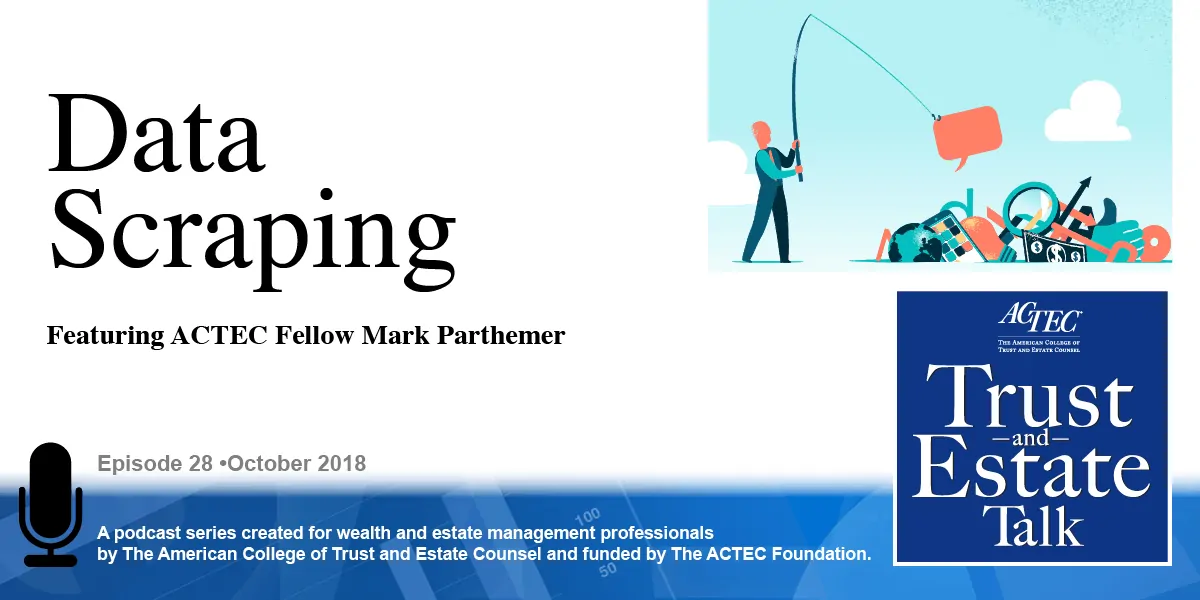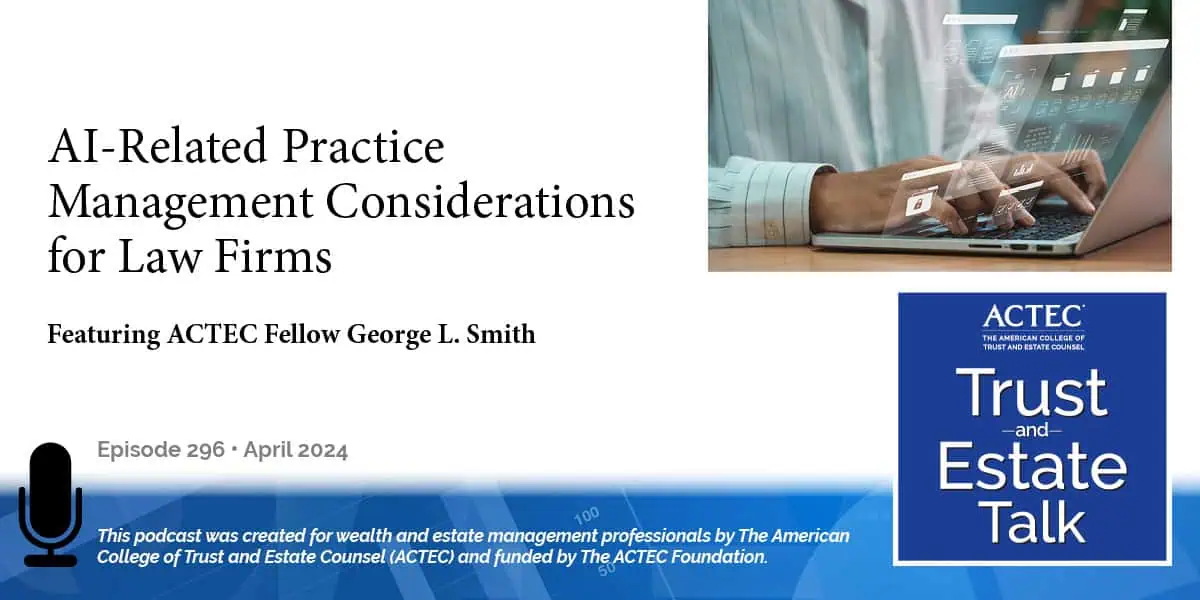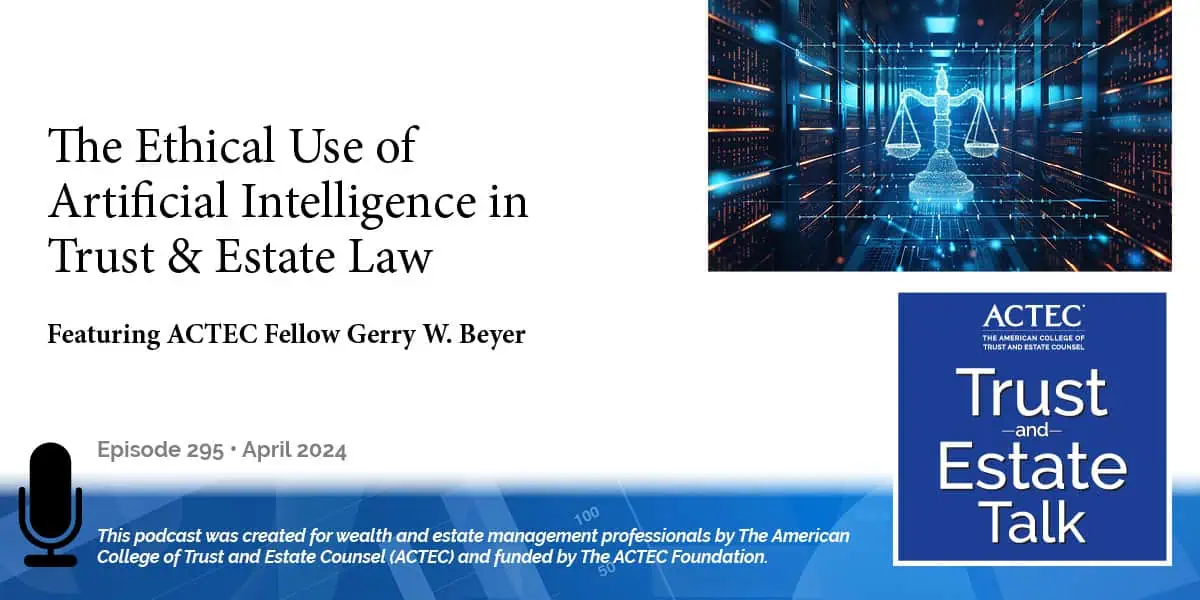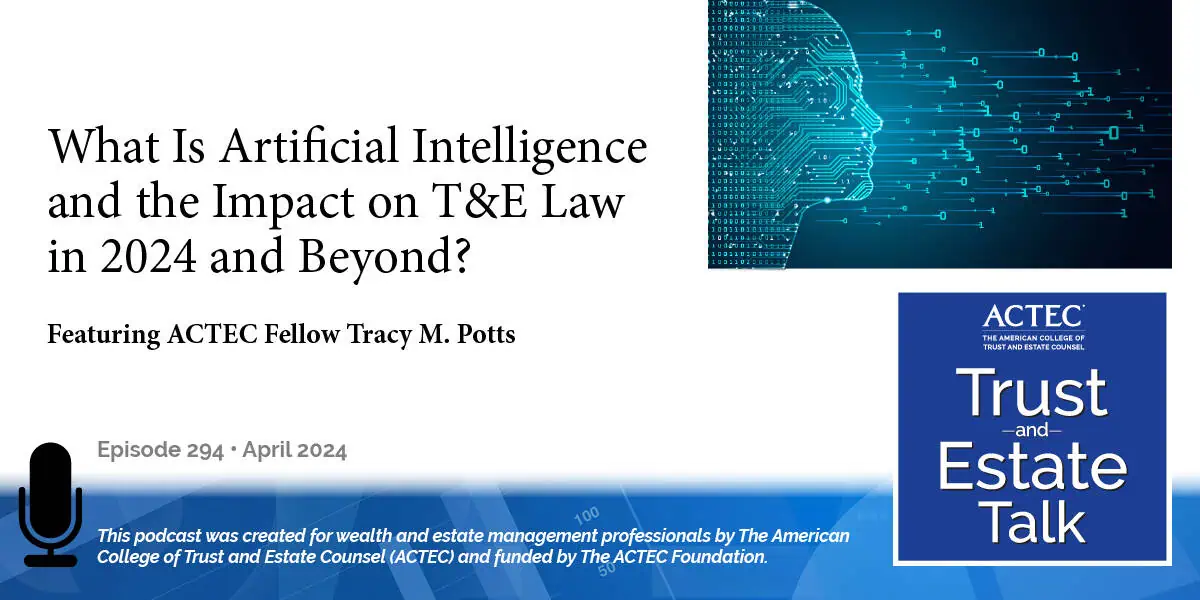Data Scraping

Transcript/Show Notes
This is Katherine Ramsey, ACTEC Fellow from Richmond, Virginia. And based on recent headlines, we’ve seen that there’s a high-stakes tug of war currently ongoing over access to information in today’s public square: the internet. To learn more about this topic, you will be hearing today from ACTEC Fellow Mark Parthemer of Palm Beach, Florida. Welcome, Mark.
Thank you, Katherine, and I appreciate the opportunity to chat with you about really the data collection that’s ongoing in today’s public marketplace, as you mentioned: the internet. This data scraping is a term that is not necessarily familiar to many of us, but really all it is, is aggregating information that’s available on the internet and using it for research and even for commercial purposes. So, how can that be done? Well, it can be done manually: we can go on, we can block and copy and gather someone’s information off manually. Really, where it becomes a little scary is the fact that technology permits the use of bots, and that tends to put a little fear in all of us. And bot is nothing more than an automated program or an algorithm that actually seeks out and segregates information over a large sample.
So, who’s doing this? Well, you know what? Our information is being gathered and scraped all the time. You do a Google search. Well, Google is aggregating that data. If you’re maybe checking a travel site and you’re going onto Priceline and you seek out, how are they really finding ticket prices? Well, they’re doing some form of data aggregation. Shopping sites do it; you go onto my Amazon account and it is going to say, “Well, based on your recent searches, this product might be of interest.” So data scraping is being done by all sorts of advertisers in an attempt to make really tailored advertisements because they’re seeking to be more productive. And of course researchers are using it, but it becomes a little concerning for many of us when we get into the commercial usage.
One of the most prevalent items, Katherine, has come into the news of late relating to data scraping and how it can really affect those in estate planning world – it seems like a little circuitous pass but it starts with media headlines dealing with this company Cambridge Analytica and something known as “people analytics.” So what are people analytics? Really it’s a data driven approach to managing people, and many times it’s being done at work. If you’ve ever seen the movie “Moneyball,” for example, well, this is really Moneyball for HR departments, because what is being done through people analytics is attempting to learn how certain characteristics and attributes may be anticipated based on behavior that’s in the public forum. And so HR departments are categorizing employees and predicting their trajectory or trying to determine what might be the most effective place for them in the company or the most efficient way to help manage them all based on people analytics.
And so at Cambridge University, there’s a center there called The Center for Psychometrics. And the Center for Psychometrics came out with a very unique proposition, and they developed a study that said, “Based on what people like on their Facebook account, you can anticipate and predict and map their attributes.” And so, a firm called Cambridge Analytics popped up, and they went to the Cambridge University Psychometric Center and said, “We would like to engage your services to assist us in mapping voter behavior.” And Cambridge University declined, but one of the professors there, a psychology professor named Aleksandr Kogan, accepted. He joined Cambridge Analytica, he built his own app, and he sent a survey out to 270,000 Facebook users asking for some information, and those users, when answering, agreed and gave permission to have their Facebook profiles shared with Cambridge Analytica. What was unbeknownst to them is the app also permitted that the user of the app would be able to go to the survey responder and not just get their profile but the profiles of every friend they had on Facebook, and 270,000 became 87 million; 87 million raw profiles were collected, and they were used to attempt to create targeted political ads in three elections: the one involving Donald Trump, Ted Cruz, and Brexit.
Now, that was 2014. 2015 Facebook tells us, “Well, we’ve revoked their ability, and we’ve asked them to destroy all the information.” But they didn’t follow up on that, and it wasn’t until it came out in 2018 that we learned when Facebook told us they had it destroyed, and they shut down every other potential data scraper in this area, they really didn’t. And that’s particularly frustrating for those of us in the estate-planning world because, you know, we had this attempted law to assist fiduciaries, friends, and families gain access to a decedent’s social media and digital assets. And that was known as the Uniform Fiduciary Access to Digital Assets Act, or UFADA. Facebook and others vehemently opposed UFADA, saying, “We go to the extreme to protect the user’s information, and we won’t just give it out, and because under UFADA there’d be a default access to that.” And so the executor or personal representative of an estate, the power of attorney, would be able to access the individual’s social information to preserve their assets, turn off their credit card on the Amazon account, access their online financial accounts so they can administer their fiduciary duties. And so UFADA introduced in 27 states was sadly defeated in all 27. We had to go back to the drawing board in response to these activities and come up with the Revised Uniform Fiduciary Access to Digital Assets Act, RUFADA, which flips the default. And it’s good to know, because we planners need to be advising our clients and saying, “Well, if you have digital assets that may be important, the law will permit you to grant access to your fiduciaries, but you have to give them consent in your governing documents.” Now, we understand that there are more things than that. In fact, earlier (podcast recorded June 22, 2018) this week Aleksandr Kogan testified in front of Congress to say that, “Oh, the information he got in the app he created was really ineffective, and the idea that they could influence an election with that information is pure ‘science fiction.’” But it still caused a media frenzy and we’re still concerned about it because the economic engine for all of the internet activity is advertising. In fact, one cynic, Jon Lancashire, had pointed out that Facebook indeed is in the advertising business, but even more, they’re in the surveillance business. It is designed to watch every move, every like and dislike of its 2.1 billion users, and then sell that information to the highest bidder.
So, what’s being done in response to this that is important and relevant to us in the estate-planning world? Well, if we think back there’s a movie, Katherine, it might have been before your time, Matthew Broderick was in back in the early 80s called “War Games.” And in War Games, Matthew Broderick was a young, technologically savvy kid, and he broke into the US Military super computer to try to simulate potential outcomes of nuclear war, and by doing those simulations, he inadvertently almost triggered World War III. Well, that actually put a little fear into a lot of individuals, and Congress responded with something known as the Computer Fraud and Abuse Act. It’s kind of the anti-hacking law and this anti-hacking law is really the only law that’s on the books. It was part of a 1984 act that began really given teeth until 1986 and it hasn’t been updated since then. And of course, you know, we’ve had the iPhone now for what – 10 plus years? 10 and a half years? No more than that. 1986 is going back a very long way in the technology world. And so, what we really find is that the CFAA is the only tool in our toolkit to combat the nefarious attempts at data scraping, but it is a blunt instrument that’s ill-designed for this purpose; it was designed for a completely different purpose.
One of the ways the CFAA works – and there’s a split in the jurisdictions in the US – as you may know, we have 12 circuit courts plus a circuit court in the District of Columbia. And so far, we’ve had six circuits decide cases dealing with data scraping, data aggregation, and the CFAA. And there’s a split – three and three among those three cases. So the CFAA says that any access to a computer that exceeds authorization is a crime and subject to criminal and potentially civil liability. So the question becomes, “What does ‘exceed authorization’ mean?” One of the things it could mean is, and this is one of the splits that we find in the second, fourth, and ninth circuit, is accessing the data and then other jurisdictions in the first, fifth, and eleventh circuits have said it’s actually using the data. And so, there’s inconsistency throughout the United States on this.
So a couple of big cases that are pending or recently resolved earlier this year in Sandvig versus Sessions decided in the lower court in the District of Columbia, March 30 of 2018. So here, researchers wanted test certain financial and housing and employment websites to determine whether the algorithms they used for the providing of their services were discriminatory. And so the researchers wanted to do this by scraping data and by creating fake user profiles. But they were worried about CFAA prosecution, so they went to the court and said, “We have a First Amendment right to this information and we want to make sure we’re not going to be sued for this.” Well, in a preliminary decision in March of this year, it was determined that, well, it’s very possible that that information is protected by the First Amendment and so the case can proceed. And the reason that comes out is that that information may be publicly available; it’s in the public marketplace – you’re walking down the street and you see a sign; what you read on that sign is publicly available and you can use it for other purposes. And so, the question becomes, if the holder of that sign says, “Well under our user agreement, you can’t have access to it, or you can have access to it but you can’t use it for commercial purposes: is that really sufficient to protect it?”
Now, there’s another big case going on right now and that’s dealing with LinkedIn and in LinkedIn the case is whether a company called HiQ can access the user profiles, and this case we should pay attention to. And the reason is because how the court determines whether the user profiles are property of LinkedIn and protected or available by the public will really circle back and affect our ability and individuals’ ability to access the social media content of our friends, our family members, and our clients. So we as fiduciaries need to be focused on that. So, Katherine, I appreciate the opportunity to talk about this and stay tuned, it’s an area we really need to learn more about.
Well, thank you, Mark, I know I have learned a great deal in just this short presentation. It’s a very timely and thought-provoking topic. Appreciate you being here.
If you have ideas for a future ACTEC Trust & Estate Talk topics, please contact us at ACTECpodcast@ACTEC.org.
Latest ACTEC Trust and Estate Talk Podcasts

AI-Related Practice Management Considerations for Law Firms
A discussion for law firms about how to incorporate AI in their practice management, including staff considerations, the “billable hour,” and more.

The Ethical Use of Artificial Intelligence in Trust & Estate Law
A law professor offers insights into the risks, rewards, duties and ethical considerations of lawyers using AI in their T&E practices.

What Is Artificial Intelligence and the Impact on T&E Law in 2024 and Beyond?
A primer on the types and uses of AI, then a deeper dive into the impact on trust and estate law from types to applications to ethical considerations.

